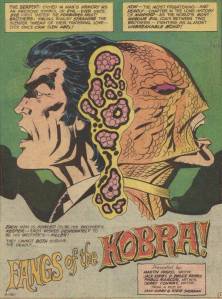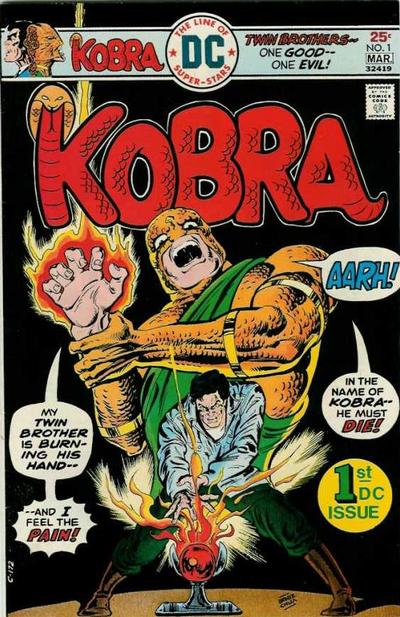Some love for the Naja-Naja
I wasn’t a DC reader. The few issues included in the mother-lode I’d inherited from my brothers were obviously sub-par, and my pennies were scarce enough already. But still, I encountered Kobra in his initial appearance, the first three issues of his title comic in 1976. You might not remember or know about these three-comics in clear plastic packs that were sold at the time, either a random set of latest issues or three in a sequence like this one, but it was one of those. I think I got it as a party favor.
It might strike you as ridiculous to sell the whole concept on “OMG psychic brothers, they can feel one another’s pain.” This was before the established genre terms of anime and psionics, though – this wasn’t hobby, it was mainstream: the national craze about Extrasensory Perception, ESP, fostered by a raft of bestsellers and especially the TV show The Sixth Sense. Everyone was supposed to be open-minded about it in the mid-70s; we even did those Zener cards and stuff in school. It was one of the early indicators that the term open-minded was a bit schizophrenic, embracing wooey bullshit as “openly” as it did new and solid thinking in ecology and genetics.
There’s more historical weight to it too: a lot of the most enthusiastic research was CIA-associated, with the assumptions and vocabulary bleeding out in the new departments of cognitive psychology, some of which had even been founded in the 1950s as CIA fronts. By the mid-70s, with books like The CIA and the Cult of Intelligence available, the idea that spooks were lurking around doing ESP stuff on people and trying to exploit it was very, very big. It boomed across the dissenter spy fiction of the time, and in politically-edgy shows like The Six Million Dollar Man. Again, it was a bit weird – the most common fashionable thinking of the day was to embrace the possibility of this “new human potential” existing, but to decry the Establishment keeping it secret, exploiting tormented talented young people, and screwing people over with it.
If you don’t think that fed right into the reboot of the X-Men rapidly about to explode onto the newsstands, then you’re missing the whole foundation of that series …
Back to this comic though. Jack Kirby had proposed the name (“King Kobra”), initial imagery, and a pencilled first issue, but left the project behind, and Martin Pasko completely rewrote it with Pablo Marcos as the succeeding artist. The story began with a startling image that illustrates the sudden relaxation in the Comics Code at that time: the birth of twins conjoined at the head. Not the splash image above, I mean, like a delivery room, with babies. They were separated surgically and grew up separately into Jason, a hip, slightly macho, alienated American guy, typical of the heroes of the day like Johnny Blaze and Jack Russell; and Jeffrey, or rather Kobra, a secret cult leader.
(Quick clarifier: I’m speaking from recollection only, from forty years ago, so now I’m thinking maybe the birth scene was a later flashback rather than the opening panels.)
The story itself is about an American security agency trying to use Jason to hunt his brother by exploiting the extra-sensory link between them.
It was really cool. Kobra was ethical relative to the cult he ruled, and the security agency was completely ruthless, clearly the story’s actual villain. The three issues ended with Jason defying the agency and even quoting Jesus Christ to characterize Kobra, with the implication that the two brothers might work out a better life if they could find a way without their respective organizations playing games with them.
It’s a totally anti-establishment story, defying conventions every which way. The only applicable term is authentic:

Mel confronts Jeff: please appreciate that this interaction and action had never occurred in comics. I’m serious – it’s new here. Note too the complexity of Jeff’s expression, which was borne out by his actions in the story.
It was also enclosed, without reference to other DC characters.This is before “universes.” (at least as far as I’d read, and as I remember – can’t speak for issue #4 and beyond, and I think the eighth, then-unpublished issue introduced Batman)
The title lasted merely seven issues, also typical of the time, and I never read past the first three, given very dodgy newsstand availability and a certain difficulty understanding DC’s release schedule. I loved them, though, and re-read them for years. Pasko dissed it over thirty years later, saying he wrote it completely tongue-in-cheek, and if that’s true, then he should have done that more often.
The character was eventually picked up much later when the DC editorial policy shifted to a more universe-style Marvel approach. They totally borked the concept, of course. In short order, Jason was dead (note: I actually don’t know if he died in the original run or not) and Kobra became a mere raving cult leader, a villain who conducted villainy because it was villainous, whose claim to characterization was pronouncing every S as “Sssss!” I don’t know if his trip about “ushering in the Age of Chaos” was established in the original run or came later, but whatever it was supposed to mean, it brought every imaginable Evil Overlord stupidity onto this poor character’s head. Except for a brief stint in the excellent 1990s Suicide Squad by John Ostrander and Kim Yale, Kobra was effectively doomed into uselessness. There’s also a latter-day reboot and re-imagining in Faces of Evil by Ivan Branko, which is out of my era and scope of thinking.
Me, I want the original Kobra back. Not as a new title or even comic, I mean I want those kinds of comics back.
Posted on March 8, 2015, in Politics dammit, The great ultravillains and tagged CIA, ESP, Jack Kirby, Jesus Christ, John Ostrander, Kim Yale, Kobra, Martin Pasko, Pablo Marcos, Suicide Squad. Bookmark the permalink. 1 Comment.




I think I need to find these somewhere, sounds really interesting and like something I could get into. Just reading this makes me want to make comics.
I think the Politics, Dammit category is going to be my favorite.
LikeLiked by 1 person